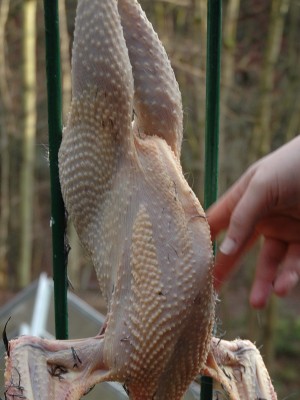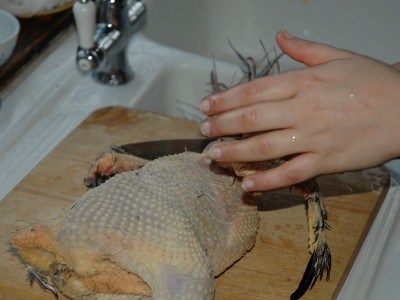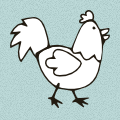Our second time killing & butchering a chicken
(WARNING: I’ve included a couple of in-progress pictures towards the end of this post and I’ve been very careful to pick ones that look little different to a bird you’d find at the supermarket. However, if you’re very sensitive, you might want to skip this article.)
We killed and dressed/butchered a chicken for the first time in 18+ months on Saturday – the first time since we had chickens of our own.
It wasn’t one of ours – our friend John B hatched some Silver Wyandotte eggs last year and they all turned out to be boys so they didn’t fit in well in his egg-laying matriarchy. They were becoming bullies so had to go. He brought one of the big fluffy boys to our house for us as his daughters have a bit of an embargo on him doing it at his house.
We killed our first chickens under his tutelage in April 2010 – just before we got our own girls. Again, they were some boys whose only crime was being boys – oh and forcibly having their way with John’s girl chickens, that was their crime too. We had already accepted that we had to be willing to kill chickens before we could keep them ourselves – for example, what if one was injured and needed putting out of its misery? or, as happened in this most recent case, if hatched eggs turned out to be boys. But as I mentioned in my blog back then, there was also the bigger picture to consider: if we only bought point-of-lay girls, then someone else was having to deal with the equal number of point of lay boys that were being born. (This great article by Throwback at Trapper Creek puts it better than I can.)
That first time, we found it strangely easy – not fun, not something we enjoy doing but easier than we thought. This time was similar. We thought it might be hard because we are so much more used to chickens now – know them as having their own personalities etc – but probably because it wasn’t one of ours, we didn’t have any issues with that.
Last time, the plucking was a lengthy chore as we hadn’t thought to do the hot bucket of water trick – this time, we did dunk the dead bird and wow, it made such a difference. It was a lot quicker & easier to pluck and we didn’t rip the skin at all. We’ll definitely be doing that every time we have to pluck from now on.
This is the bird almost much entirely plucked clean – it’s still complete at this point, except for its feathers.
The division of duties is that my John does the killing, we both pluck then I butcher/dress it. Seeing how much effort my foot-taller/considerably-stronger boyfriend has to put into it and knowing I easily get painful knuckles, I’m not sure I could physically kill the birds and on the flip side, I’m much more confident with using knives than John is, so it works out well. I was a little unsure how much of the butchering process I could remember from last time, but aside from forgetting to pull out the crop & windpipe until it came out in my hand as a bit of a surprise, I think I did pretty well (my criteria: did I cut/break the intestines and spray poo everywhere? no? then I did pretty well! ;) ) Another thing: since I don’t have a big cleaver for getting through the neck/legs (and am also too scared to use one), I put the knife in place then whacked the top of the blade with a wooden rolling pin. Last time, I think we used a misc wooden block but I think the longer rolling pin worked better.
(That’s me cutting off the head – I didn’t intend for my hand to censor the action, it’s just the way it was. The feet, then wing tips will be next, followed by the gutting.)
The bird turned out to be quite a skinny fellow underneath all his fluff but his legs, breasts & wings weighed just under 1kg/2.2lbs in total so we’ll get a few good meals out of him. The offal – the heart, liver and skin, which I’ll cook for the animals – was another 300g and the carcass (for stock) about 400g. His head, intestines (and other innards) and feet went in the bin; his feathers in the compost.
In the future, if we get/create a bit more space, I’m tempted to raise a dozen meat birds each summer to give us one a month in the freezer. I’m glad we get to experience different parts of the process before we make that sort of commitment though.
Have you killed chickens for meat? What do you find is the hardest part?







The bits that you binned would do very well in a hole under a plant that you plan to plant at the same time as the killing.
All our new fruit trees have deceased layer chocks under them and are doing fantastically on the blood and bone ;)
I love that the whole process is zero waste and completely on-site.
Well done on your butchering job. I’ve only done that once as we have not had any young birds to deal with. I have ex-battery rescue chooks.
Good point – we should have buried them. Will do that next time!
I imagine it’s not an easy task. One time, killing and butchering and animal, such as a wild deer or whatever would have been essential to survival, no we just worry about what to do with the plastic wrappers and their impact on the environment.
I did wonder if I would have the ‘guts’ excuse the pun to kill an animal as I always thought of myself as squeamish, and I am really interested in a self sufficient way of life, but as I recently returned to being a vegetarian I guess it’s not something I am likely to ever have to worry about.
There is an interesting video of Ray Mears butchering a deer in the wild, I am sure you can find it on youtube. I wondered where all the blood had gone but I think it had been previously drained so that when he started to cut it up it was clean. But he illustrated how every part was once very useful then he proceeded to cook it under some hot rocks.
Well done.
I remember a friend at uni told us a story about visiting her family in Eastern Europe and being told that they had to kill a chicken for their dinner. I said at the time “I just wouldn’t eat!” so it’s quite surprising that I’ve found it so easy to step up… While I’m not the one doing the actual killing, I find the butchering part more fascinating than squirm-inducing — quite a turn around!
I’ll look for that Ray Mears video. Chickens have surprisingly little blood in them – we did drain it before butchering but it’s surprisingly how little comes out… I suspect a dear will have quite a bit more than that though!
When we first hatched our own chicks and some of them grew into cockerels we killed them to eat. In all honesty I couldn’t do the actual killing and left that to John, but I cooked them into a coq au vin. Because we eventually want to rear our own meat I made sure I thought of the chickens as I ate them so that I didn’t try to distance myself from what I was eating. Turns out I had no weird feelings about eating them. In fact, it was the best chicken I’ve ever eaten! Made even tastier by knowing exactly how their life was lived and that it was a fabulous life! I’ve never heard of the hot water bucket trick but will do it next time we kill some (tomorrow – three cockerels have started cockerelling!) if it makes the plucking easier!
I thought the same – that it would be weird. But as soon as they’re plucked, they just look so much like bought-from-the-supermarket chickens that it just became “food” to me, and easier to deal with :)
The hot water bucket trick DEFINITELY makes it easier for us – hope you find the same :)
We’ve just reared meat chicks for the first time and will have one for Christmas dinner. I’m fond of my layers so it was an effort to keep remembering that the others would only be with us for a short time and for a definite purpose. However, I know that they had as good a life as I could give them and a quick end in a familiar place. My husband did the deed. We had six and did them over two days because we are slow processibng them. No doubt with practice, we’ll get faster. We cut most of them up so that they would fit in the freezer more easily and made stock and soup from those carcasses.
We’ve got a fair bit of homegrown veg to go with the homegrown chicken for Christmas dinner so I am feeling quite pleased with that meal.
We got the chicks off heat at five weeks old from Cyril Bason as we knew somebody that was going to buy some layers from them. They cost £3.50 each and ate their way through almost 3 sacks of growers pellets in just short of 8 weeks. The finished size (oven ready) was between 7.5 lbs and 9.5 lbs. If we had to pay £20 carriage they would have cost more but because we had a friend going there anyway, it actually proved cost effective, which was a bonus. I’d have liked to try a more traditional breed rather than a Ross-Cobb but that was what was available off heat (no facilities for heat here) at the time when our friend was going there. This was an experiment that we have pondered but was fast-forwarded into reality by our friend’s visit. We would probably do it again.
Thanks for the comment Jo, that’s really interesting.
I’d imagined using our layers as chick incubators when we can finally bulk grow meat chickens but it’s interesting to know we could get them off heat.
Good article. I was searching for info on how much a Wyandotte dressed out to.
I’d like to see some pics of your finished dishes sometime. And whar’s your opinion of the taste? Besides small any difference from store bought?
Hi Lee,
I’m not sure how old the Wyandotte was when we butchered it – possibly about 10 weeks. I think in ideal circumstances, it should have been left to fatten up for a bit longer but since it was bullying the others, it had to go ASAP.
We’ve only eaten the breasts of that one bird so far – and in a heavy sauce – so I can’t really comment on the taste of that one, but the organic free-range birds we get from Swillington Farm are huge and very, very tasty. There is a noticeable difference in meat quality and taste. Not sure what breed they are – I’ll ask.